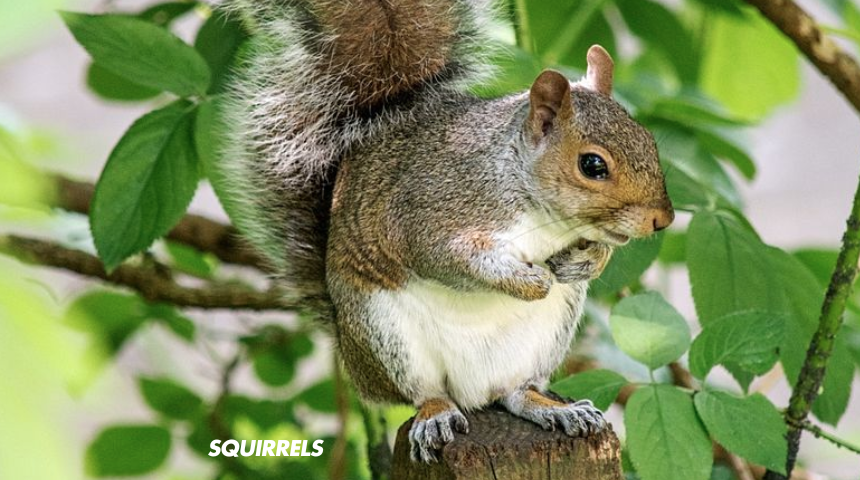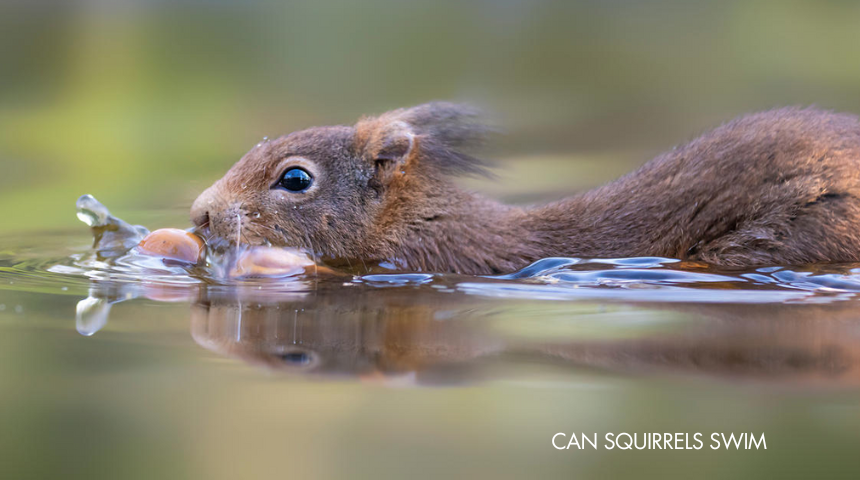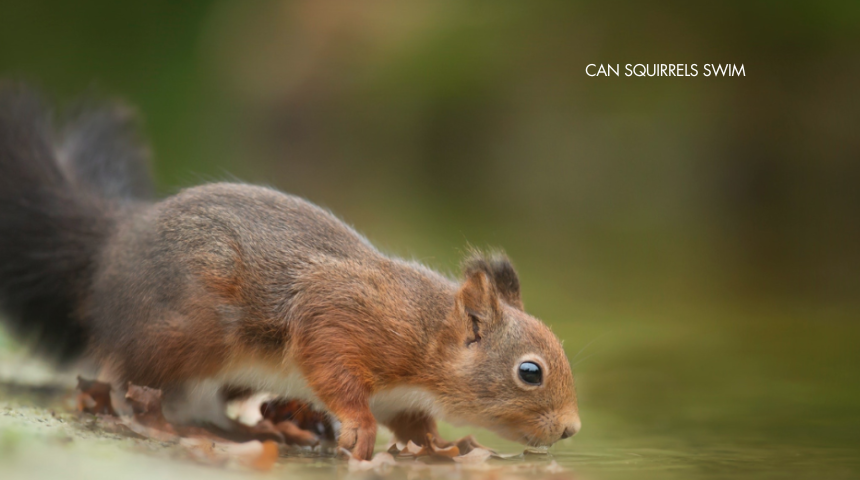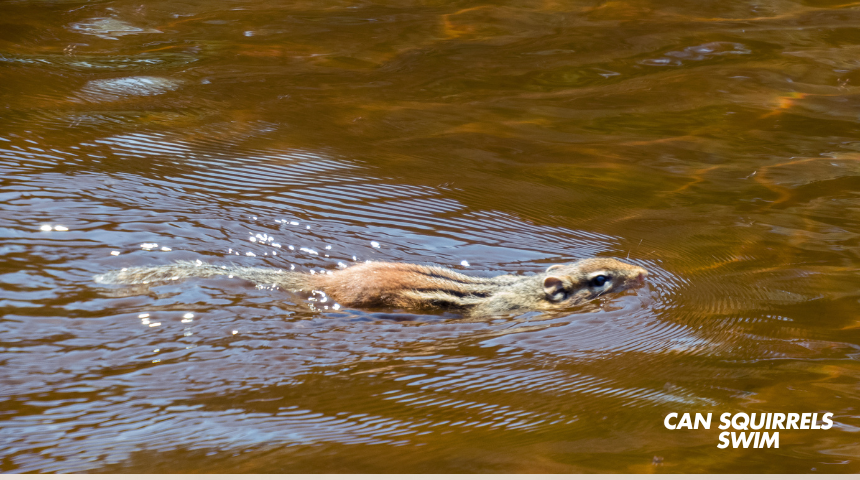Can A Squirrel Swim- When you think of squirrels, you likely imagine them darting through trees, gathering nuts, or cheekily raiding bird feeders. But have you ever wondered Can A Squirrel Swim?
Surprisingly, these small and nimble creatures possess a range of abilities beyond their famous tree-hopping skills, including swimming.
This blog delves into the aquatic side of squirrels, exploring their swimming capabilities, how they use this skill in the wild, and answering common questions about these fascinating animals.
Can A Squirrel Swim?
Yes, squirrels can swim! While they are not naturally aquatic animals, they can swim when necessary. Their bodies are well-adapted for movement, with strong limbs and lightweight frames that help them navigate through water.
They use a dog-paddle style, moving their legs in a coordinated motion to propel themselves forward. Their bushy tails play a role in balancing and steering, though they’re not as efficient as those of animals specialized for swimming.
Habitual Actions (About Squirrel)
The squirrel is a restless little creature, always on the move. It leaps with unbounded energy from branch to branch, tree to tree. Rarely does it settle in one place, as if the world is its playground.
Its bushy tail sways gracefully behind it, adding charm to its otherwise mischievous nature. Observing a squirrel’s antics can be delightful, but its endless curiosity often leads to trouble.

Known for its fondness for fruits and nuts, the squirrel doesn’t merely eat—it tends to waste. It nibbles on ripe mangoes, chews guavas, and leaves a mess in its wake.
Farmers and gardeners often find their hard work disrupted by this tiny creature’s mischief. Yet, despite its flaws, the squirrel remains an endearing symbol of vitality and joy.
Why Do Squirrels Swim?
Squirrels generally avoid water unless they have a compelling reason to swim. Here are some scenarios where a squirrel might take to the water:
Escaping Predators: If a squirrel is being chased by a predator and water is the only escape route, it will plunge in and swim to safety.
Searching for Food: During times of scarcity, squirrels may cross rivers or streams to reach areas with abundant food supplies.

Relocation: Squirrels are territorial creatures, but they sometimes need to relocate due to habitat loss, competition, or seasonal changes. Water bodies might lie in their path, forcing them to swim.
Accidental Falls: Tree-dwelling squirrels occasionally fall into water while navigating branches, especially near lakes or rivers. Once in the water, their survival instinct kicks in, and they swim to the nearest shore.
Do Squirrels Like To Be In Water?
Squirrels do not typically enjoy being in water. Unlike aquatic animals, they do not seek out water for recreation or comfort.
Squirrels enter water only when it is necessary for survival, such as escaping predators or crossing obstacles. Their preference is to stay on dry land or in trees, where they are more agile and comfortable.
Can Squirrels Swim In The UK?
Yes, squirrels in the UK can swim just like squirrels elsewhere in the world. The native red squirrels and the more common grey squirrels are both capable swimmers.

If they encounter rivers, streams, or ponds in their habitat, they can cross them when necessary. However, they do not actively seek out water bodies and prefer to stay in woodlands and urban parks.
Can Squirrels Hold Their Breath Underwater?
Squirrels cannot hold their breath underwater for extended periods. They are not adapted for submersion like aquatic mammals.
If a squirrel is underwater, it is usually accidental or part of a brief struggle to swim across a body of water. Prolonged submersion can lead to drowning, as squirrels rely on their quick paddling to stay above water.
How Well Can Squirrels Swim?
While squirrels are capable swimmers, they are not built for long-distance swimming. Their small bodies can tire quickly, and prolonged exposure to water can be dangerous.
However, in short bursts, they exhibit impressive determination and agility. Observations of squirrels crossing rivers or small ponds show that they are resourceful and adaptable animals.
The Role Of The Tail In Swimming
A squirrel’s bushy tail is one of its most distinctive features, and it serves several purposes. In water, the tail acts as a rudder, helping the squirrel steer as it paddles.
Although not as effective as the tails of aquatic mammals, it provides some stability and direction during a swim.

Risks Of Swimming For Squirrels
Swimming is not without risks for squirrels. Here are some challenges they face in water:
Energy Drain: Swimming is physically demanding, and a squirrel can quickly exhaust itself if the distance is too great.
Predators: Aquatic predators like large fish or birds of prey may target swimming squirrels.
Hypothermia: Extended time in cold water can lead to hypothermia, which is dangerous for small mammals like squirrels.
Drowning: If a squirrel cannot find an exit or becomes too fatigued, it risks drowning.
Squirrels And Water-Related Myths
There are several myths about squirrels and their relationship with water. Let’s debunk some of the most common ones:
Myth: Squirrels cannot swim. Fact: Squirrels can swim, but it’s not their preferred activity.
Myth: Squirrels use their tails as floats. Fact: A squirrel’s tail helps with balance and steering but does not function as a floatation device.
Myth: Squirrels can’t survive after falling into water. Fact: Squirrels often survive accidental falls into water by swimming to safety.
How Do Squirrels Compare To Other Animals?
Compared to aquatic animals, squirrels are not efficient swimmers. However, among land-dwelling animals, their swimming abilities are notable for their adaptability. For example:
- Better Than Rodents: Unlike many rodents that avoid water, squirrels’ lightweight bodies and agility give them an edge in short-distance swimming.
- Inferior to Aquatic Mammals: Beavers and otters are specialized swimmers with webbed feet and streamlined bodies, making them far superior to squirrels in water.
Famous Instances Of Squirrels Swimming
In some cases, squirrels have surprised observers with their swimming feats. For example, there have been reports of squirrels crossing wide rivers during migration periods or swimming across ponds to reach bird feeders.
FAQ
Can a squirrel drown?
Yes, squirrels can drown if they become too fatigued, disoriented, or cannot find an exit from the water.
Do squirrels like water?
Squirrels generally avoid water and only swim when necessary. They do not show a preference for water activities.
How far can a squirrel swim?
Squirrels can swim short distances, typically crossing small rivers or ponds. Long distances are challenging due to their limited stamina.
Can baby squirrels swim?
Baby squirrels are not adept swimmers and are more vulnerable in water than adults. They usually stay away from water.
What should I do if I see a squirrel struggling in water?
If safe, you can assist by providing a branch or object for the squirrel to climb onto. Avoid direct contact, as squirrels can bite when stressed.
Conclusion
So, can a squirrel swim? The answer is a resounding yes, but swimming is not their natural habitat or preferred activity. Squirrels are resourceful creatures, and their ability to navigate water when necessary is a testament to their adaptability.
While they may not be expert swimmers, their determination and agility make them capable of surviving challenging situations.
Next time you see a squirrel frolicking in your yard, remember that these tiny adventurers are equipped with more skills than meets the eye.
Whether leaping between trees or paddling through water, squirrels continue to amaze us with their resilience and charm.